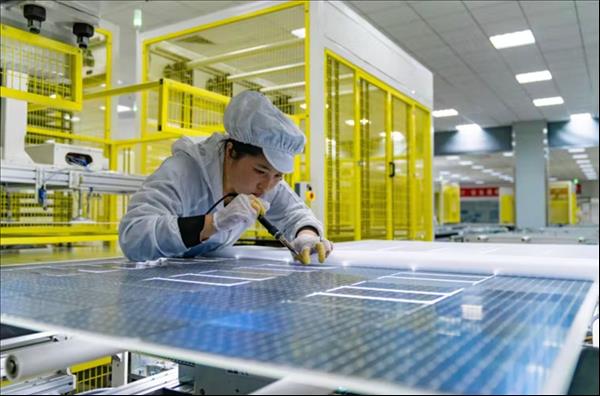(MENAFN- Asia Times) In a mirror image of what the United States has been doing with semiconductor lithography technology, China has recently amended its rules to ban the export of several core solar panel technologies in order to maintain its leading status and global market share in the sector.
A solar panel on a rooftop may include a hundred pieces of silicon and China has the lead now in machinery to manufacture those. Now Chinese manufacturers have been forbidden to use their large silicon, black silicon and cast-mono silicon technologies overseas, according to the newly-amended export guidelines published by the Ministry of Commerce and the Ministry of Science and Technology.
Chinese firms produce more than 80% of the world's solar panels and modules but have faced heavy tariffs imposed by the United States over the past decade.
Some of them moved their facilities to Thailand and Malaysia to avoid the tariffs but Beijing does not want them to take their core technologies abroad.
Technology experts said China wanted to prevent India from becoming one of the world's major solar panel suppliers.
In 2011, the US Commerce Department ruled that China was dumping solar panels in the US market. In 2012, it imposed duties on Chinese solar panels.
Some Chinese solar panel makers moved to Taiwan to try to evade the tariffs but the US expanded its tariffs to apply to the island.
They then moved to Cambodia, Malaysia, Thailand and Vietnam. Last June, the Biden administration said it would waive tariffs on solar panels imported to the US from these four countries for 24 months.
To forbid more Chinese firms to transfer their core silicon technologies overseas, China's commerce ministry last month proposed to include these technologies in its import and export guidelines.
This may sound like closing door after the horse is out of the barn, but that's not quite the case. Companies may have moved some machines abroad already to make large-sized silicon – but when they need parts, machines and technical support they cannot any longer buy from mainland China
Beijing also proposed to restrict the export of the country's laser radar, genome editing and agricultural cross-breeding technologies. A public consultation began on December 30 and ended on January 28.
After the consultation, the commerce industry decided to ban the export of large silicon, black silicon and cast-mono passivated emitter and rear cell (PERC) technologies.
A Chinese IT columnist said large silicons sized between 182mm and 210mm would become the world's standard as their market share had grown from 4.5% in 2020 to 45% in 2021 and would probably increase to 90% in future.
He said Chinese firms that tried to produce large silicons overseas would be affected by the new export ban as they might be unable to purchase the necessary equipment from China.
In the solar panel sector, small silicons refer to those sized at 166mm or below. The larger a piece of silicon, the lower the power generation cost.
Song Hao, an assistant vice president of GCL Technology, a supplier of electronic wafers for the solar industry, said that while the export ban would restrict Chinese firms from expanding overseas it would not choke off export of their products from China.
Song said it was reasonable that China banned the export of its most advanced solar panel technologies as many developed countries have done similar things to China in the past.
Lu Jinbiao, a deputy director of the expert committee of the Silicon Industry of China Nonferrous Metals Industry Association, said the export ban on black silicon and cast-mono PERC technologies may not have a big negative impact on the industry as they are no longer commonly used.
Lu said many Chinese solar panel giants, including Longi Green Energy Technology, JA Solar Technology and Trina Solar Co, had already moved their production lines to Southeast Asia over the past two years. He said these firms would face some restrictions if they wanted to buy crystal furnaces or silicon material cutting equipment from China to make large silicons.
Yu Duo, a solar power analyst at Oilchem.net, said India launched a series of new measures to support its solar equipment manufacturers last year in a bid to reduce its reliance on Chinese products. He said China wanted to prevent India from obtaining its technologies.
read: biden finally rethinking trump's china trade war
Follow Jeff Pao on Twitter at @jeffpao3




















Comments
No comment